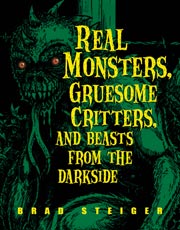The Chindi
Navajo artist David Little Turtle explained the eerie details of the Chindi, a shape-shifter that acts as a kind of avenging angel to those who show disrespect to any of the Earth Mother's creatures.
"It can assume any shape," he said, "or, perhaps more accurately, it can inhabit any living thing. Almost any traditional Navajo has at least one Chindi story to tell. He or she will tell you about coming home at night and seeing a coyote walking on its hind legs."
According to Navajo tradition, one of the ways of knowing that an animal harbors a Chindi is that it will walk upright, like a human. Another sure way of identifying an animal that harbors a Chindi is that its eyes will appear dead. If your headlights hit the animal's eyes and they do not reflect the light, you will know that a Chindi has possessed the creature.
How the Chindi responds to an innocent person depends upon that individual's attitude toward the Earth Mother and whether or not he or she has a good heart.
If a Chindi should have been set against you for any reason, the only way you can stop the energy is draw a Medicine circle around you and sing or say a prayer for protection. "It need not be a Navajo chant," Little Turtle said. "Sing or say aloud any prayer you know. The important thing is your attitude. If the Chindi sees that you have a good heart, the evil energy will boomerang and return to the one who set it upon you."
And what about the worst case scenario? What if a wolf or coyote or fox appears at your door walking on its hind legs and you don't know how to draw a proper Medicine circle or sing the right kind of prayer? Can you stop it with a silver bullet?
Little Turtle soberly informed me that there is no kind of bullet that can stop a Chindi. "If you kill the host animal," he explained, "the Chindi will simply enter another animal. And another and another ... until it has worked its vengeance upon you."
The tragic account of the Navajo Long Salt family is the most completely documented story of the Chindi's persistence in exacting vengeance. Incredibly, the avenging spirit pursued the members of this one clan for over one hundred years.
The Long Salt's ordeal began in 1825 when a man of the family became ill because of nightmares that constantly troubled his sleep. He confided in his brothers that he was being visited by the angry spirit of a man that he had killed.
His older brother protested that the man had been their family's enemy for years and that he had been slain in a fair fight. According to tribal law, the killing had been justified.
The tormented man explained that the spirit was restless because he had been struck down before he could sing his death song. They must find a Medicine priest to rid him of the troubled spirit--or he would surely die.
The Long Salts sought assistance from an old, blind Medicine priest from the Tsegi country who, at their request, held a three day b'jene (sing) over the afflicted brother. After the final day of the ritual, the troubled man sighed his relief and his gratitude that the restless spirit had departed and that he could now sleep peacefully.
For his pay, the blind priest had asked for five butchered sheep from the Long Salt's herd. The requested recompense was surely fair, and the powerful Long Salt clan, who at that time numbered over a hundred members, possessed many sheep. But since the flock was grazing at a considerable distance from the old priest's village, the two Long Salt men assigned the task of slaughtering the sheep decided to substitute five wild antelope in their place. After all, the old man was blind. He wouldn't be able to tell the difference between the animals, and they would preserve five valuable sheep for the family's own use.
The Long Salt elder who awarded the priest the five carcasses was himself unaware that antelope had been substituted for the specified sheep. With the animals' heads cut off and their lower legs removed at the knees, even those at the ceremony rewarding the Medicine man were unaware of the deceit that two members of their family had perpetrated.
A few weeks later, an older member of the Long Salt family who had been healthy and without illness died suddenly. Then a very young and robust Long Salt male fell dead for no perceptible reason. As his pregnant wife and other family members sang their mourning songs, an uneasy feeling began to grow that something was not right.
Every few weeks after the young husband's death, a member of the Long Salt family would become ill, begin to waste away, and then died in suffering. To the wiser members of the family, it was becoming increasingly obvious that a Chindi had been set against them. But why?
When at last the two men confessed substituting the antelope for the sheep, a council of family leaders agreed that selected delegates would meet with the Medicine priest and seek to rectify the situation without further delay.
The old priest admitted that he had discovered the deception and had become very angry. He also acknowledged that he had set a Chindi against them with the instructions that the entire Long Salt family should be eliminated one by one.
The representatives of the Long Salts beseeched him to call off the avenging spirit. They tried to make him understand that they, too, had been duped by two deceitful and lazy members of the clan. They did not intend to cheat him. And already many members of their family had been killed by the Chindi.
The elderly Medicine priest carefully evaluated their words and deemed them sincere. He told them that he was not an evil man, but he had been forced to uphold his dignity and reputation. He would remove the curse, but he must charge them a price somehow commensurate with the laws of the spirit world that had required him to set the Chindi upon them.
The Long Salt delegates answered that they would not question his judgment. They would pay whatever price he asked in order to call off the Chindi and to save the lives of their family members.
The old priest called his son to his side, complaining that he was now very tired--too weary to determine a proper compensation. He bade the Long Salts return in ten days. At that time, both parties would agree to the terms of payment.
The Long Salts were dismayed, but they knew better than to protest the old man's decision.
On the morning of the tenth day, the delegation from the Long Salts was prompt in keeping the appointment at the hogan of the blind Medicine man. But they were greeted by a family in mourning. The elderly priest had passed to the land of the grandfathers three days earlier.
The desperate Long Salts asked the man's son if he had called off the Chindi before he died. To their horror, they were unable to determine if the curse had been lifted. The priest's son could only tell him that he knew that his father had thought much about the problem before he died.
By the time the Long Salt delegation returned home, several members of the family lay ill and dying.
In the August-September 1967 issue of Frontier Times, John R. Winslowe wrote that he met the last surviving member of the Long Salts in 1925, a slender teenaged girl named Alice:
Curiously, anyone marrying into the family met the same fate as a blood Long Salt. Alice's mother died when the girl reached seven and she was attending the Tuba City boarding school at the Indian agency. Alice's father became skin and bones, dying two years later.... The remaining three Long Salts [Alice's two uncles and an aunt] were ill, crippled, and helpless. Friends cared for them, watching them fade into nothing before their eyes.
An aging but determined Navajo named Hosteen Behegade adopted Alice Long Salt and swore that he would protect her from the Chindi's mission to destroy the sole surviving member of once proud and prosperous family. Behegade was incensed that so many people had to die because of the deceit of two lazy men who had tried to deceive an old priest, and he devised a plan to keep moving, to somehow stay one step ahead of the Chindi.
In the winter of 1928, the desperate wanderers found themselves seeking refuge from a blizzard in a hogan three miles from the trading post on Red Mesa. The blizzard developed into the worst snowstorm in years. Surely not even the Chindi could find them amid the deep-piling snow and the fierce howling wind.
The next morning, Alice Long Salt lay dead. The final propitiation had been exacted. At last the Chindi would return to the unknown realm from which it had come, its one-hundred-year mission of revenge completed.
From The Werewolf Book: The Encyclopedia of Shape-Shifting Beings, Second Edition by Brad Steiger, (c) 2012 Visible Ink Press(R)
Steiger's homage to the beast within provides meaty facts for the lycanthropic in all of us.










